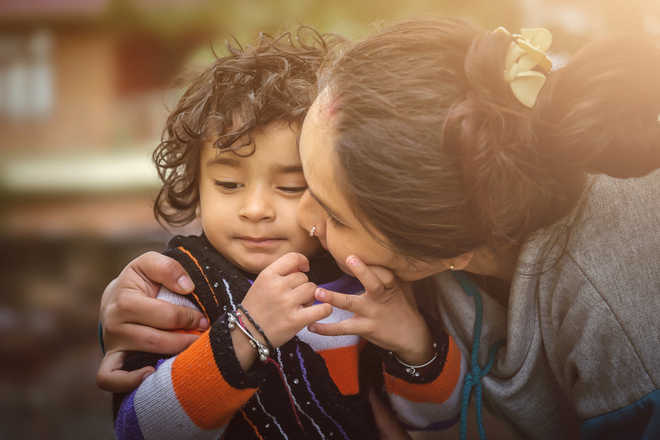
The photo has been used for illustrative purpose only
Purnima Sharma
Since college, I wanted to adopt a girl and bring her up as my own,” says Vandana Goswami, looking fondly at her two children — Anand, her biological child, and daughter Rachna, whom she adopted from an orphanage. This was a given when she married Chintan Singh, a writer. “As part of my social work programmes, I often visited homes for the orphans. My husband willingly helped turn my dream of adopting a child from an orphanage into reality,” says Goswami, an author. A decade later, the family has bid adieu to life in Gurugram, courtesy pollution in the NCR and lives in the hills of Kumaon. Their children attend the local village school.
Chintan recalls their excitement when they received a call from the adoption agency stating that they had found a match. “Since then, Rachna has been ours. To anyone who doesn’t know, she could well be our birthchild, given the fact that there is just a one-and-half year difference between the two children. I am happy that she shares her complexion with mine,” he smiles.
With the grandparents kept in the loop throughout, the elderly couple hosted a grand Lohri party for baby Rachna like the one they had for Anand. “All our relatives were part of the celebrations,” adds Goswami.
She smiles as she recalls queries from her children like, “Mamma, where did I come from?” To this she would say, “Anand came from my tummy and Rachna from my heart.” This made both feel special and privileged, she adds.
That is the way it should be, says Barbara Freedgood, US-based adoptive parent and therapist who leads adoptive support groups. Among the suggestions she has for parents who have adopted a child is to “start talking to your child about their adoption right away — even if your child is a toddler. Keep it very simple, and keep it appropriate to the child’s age”.
For instance, “before the age of five, all children need to know they are adopted, and it’s the way to form a family.” Also, emphasise that you are a “forever family”.
That is something that Sandip Soparrkar, a single dad, insisted on right from the time Arjun came into his life 11 years ago. “Everyone in the family makes him feel special.” The Mumbai-based salsa dancer adds, “My son knew from the beginning that he was special, and even different, because, unlike other children, he has two birthday celebrations — one, on the day of his birth, and the other, on his homecoming day.” Both celebrations have since translated into big parties — one at home and the other at the orphanage in the presence of other children there.
We’ve come a long way since the time adoption was kept under wraps, not just from the world but also from the child. Remember movies like Waqt, Kabhi Kabhie and Raja Babu had certain dialogues to make the adopted child feel inadequate or at a disadvantage? Bollywood certainly did not help matters. Fortunately, times are a-changin,’ and so are attitudes, especially in cosmopolitan cities. And parents of adopted children agree with American singer Sheryl Crow when she says, “Little souls find their way to you, whether they are from your womb or someone else’s.”
People have certainly opened up towards adoption, says Sanjay Patil of the Love Trust for Indian children in Buldana, Maharashtra. “There was a time when there were more children up for adoption. But today, the demand far exceeds the number available. The process to adopt a child is a bit slow, but it’s far more transparent with CARA (Central Adoption Resource Authority), the centralised government agency screening the PAPs (prospective adoptive parents), and ensuring they find the perfect ‘match’ for them.”
“Maybe it’s because of this matching right from the beginning that I felt there was past connect between us,” says Soparrkar.
An easy camaraderie needs to be shared between the parents and the adopted child, says Vandita Dubey, a US-licenced clinical psychologist, adding what tops the list is never to think of the child as adopted or flaunt it “like a badge of honour”.
“In a conservative society like ours, people prefer keeping it low-key — remember, if you don’t make a big deal of adoption, there’s a better chance that your child won’t either.”
Zamrooda Khanday counts herself lucky that she didn’t have to wait long for her second child, Sehar, from an adoption centre in Mumbai.
“My biological son Ayaan knew we were adopting and was thrilled that he’ll be getting the sibling that he’d been asking for,” says Khanday, remembering the welcome party organised for “little” Sehar. The family had celebrations similar to those that were organised for Ayaan, like the 40th day party after the birth of the baby as well as the mundan ceremony.
While many parents are now adopting children to raise them with their biological ones, others do so because they are not been able to have children of their own. “Bringing Pari home was worth the wait — first for the biological child, and then, for the court to give the green signal to let her become part of our lives,” says media executive Tanushree Das. And right from the time she was “introduced” to their family (at a havan ceremony) and friends (at a Cinderella-like ball party for children), Das says life keeps opening delightful new chapters for the family. “You should see how both her grandparents spoil her. And that’s where I have to step in to balance things out (and become the strict mom),” she laughs.
(Some names have been changed to protect identities)
Want to adopt a child? Bear these in mind
- Is everyone happy with the decision? This is a major decision, so everyone, including the grandparents, must look forward to it. This will ensure a happy environment for the child.
- Is there an ideal age for a child to be adopted? This is a personal decision. The youngest you can adopt is three months because firstly, anyone putting their child up for adoption has up to 60 days to change their mind; and secondly, you must allow at least one month for procedural matters. While a very young child will have no memory of any other parent and will only know and remember you, an older child’s personality and traits are more visible.
- Is the adoption agency’s decision final? In adoption, you can request a particular gender or a skin colour. Besides that, the adoption agency is the final authority. Once the adoption is complete, then it is as absolute as having a biological child.
- Is it possible to treat yourkids as absolute equals? Yes, you must. This is a critical pre-requisite for your family to be happy. If you are afraid you might differentiate, think it through. If you remain uncertain and unsure, don’t adopt.
- Don’t flaunt it: This is a personal decision a family makes. Don’t hide it, but also don’t rub it in people’s faces. But, of course, your child and relatives should always know.
- Have a peer group for the child: It helps if there are other adopted kids in the immediate circles — people the child knows. That makes the child not feel any different and realise that adoption is common and not a big deal.
- Patience is the buzzword: Right from the time you call CARA, you are informed that it might take anywhere up to four years to find a match. While it often happens sooner, adoption doesn’t have the predictable path of a pregnancy. It could stretch to a couple of years even before an ideal match is found for you.
— Courtesy Dr Vandita Dubey, clinical psychologist



























